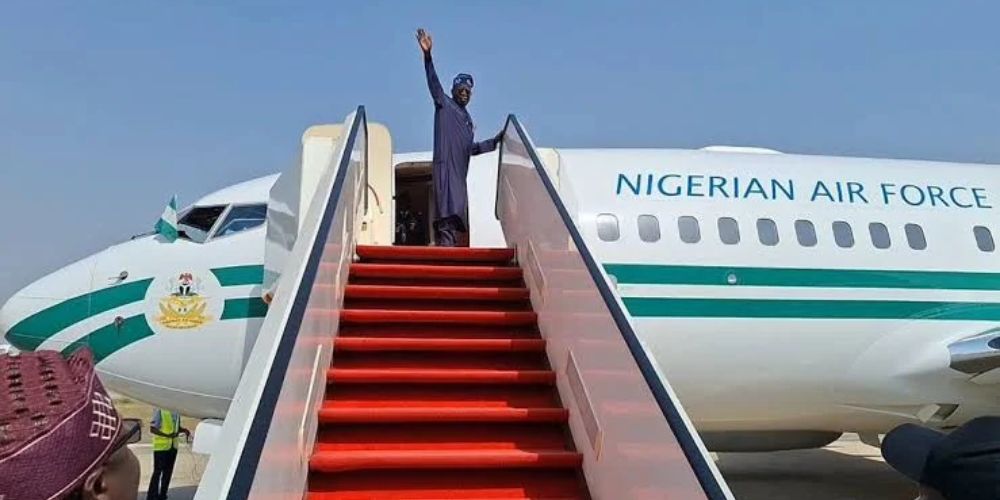570
Daniel Adaji
The President Bola Tinubu-led government has spent no less than N26bn on maintaining the Presidential Air Fleet between July 2023 and August 2024.
This expenditure has sparked widespread criticism over excessive government spending amidst Nigeria’s economic hardship.
The figure, obtained from BudgIT’s GovSpend platform by Pointblanknews.com, shows at least 29 separate payments made under the “Presidential Air Fleet Forex Transit Funds” and “Presidential Air Fleet Forex Transit Fund” descriptions. All payments were routed through a single beneficiary account: the Presidential Air Fleet Naira Transit Account.
The largest transaction during the period was N5.07bn, with several others ranging between N1.2bn and N2.4bn, indicating a consistent pattern of high-volume expenditure.
These figures come amid public calls for belt-tightening and fiscal discipline from the same administration, raising questions about government priorities at a time when many Nigerians face inflation, rising living costs, and subsidy-related economic shocks.
Speaking with Pointblanknews.com on Saturday, a fiscal responsibility advocate, Victor Agi described the spending as “wasteful” and symptomatic of Nigeria’s distorted budget priorities.
“The issue of the presidential jet maintenance is like many other things that the government keeps getting wrong in terms of how do we make them fiscally sound,” Agi said.
He condemned the imbalance between recurrent expenditure and capital investment, warning that continued funding of luxuries like presidential travel undermines national development.
“How does it make sense that the government spends so much on recurrent components of the budget while major and capital infrastructure components continue to suffer?” he Stated.
“When you hear that N26bn is being spent on maintaining the aircraft in a year, if you check, that whole money for that particular year will be released. When you compare that to the level of release for the capital components of the budget year on year for that year, you’ll discover that the level of release is insignificant.”
Agi pointed out that Nigeria is still implementing its 2024 budget as of June, even as the 2025 budget has been passed into law – evidence of what he called “a disconnect in fiscal planning and discipline.”
He urged the federal government to curb executive travel as a means of cutting costs.
“The simple thing is to cut your travels. The travels that they continue to every year, what impact have those travels brought to Nigeria’s economy?”
“When the president decides to go on vacation every now and then, and of course go for his health check every now and then and even meaningless foreign meetings, we will continue to have these bloated expenditures,” he said.
“If you think you can be going for holiday every day then pay from your pocket. It speaks to the whole conversation of the government asking people to cut cost and they’re living fat with their aides. Competitively I can say for sure that it doesn’t make sense for any government to spend that much on Presidential air fleet maintenance. Something has to be done,” Agi added.
In 2024, Vice President Kashim Shettima was forced to cancel his trip to the US-Africa Business Summit due to a fault with his aircraft, further highlighting concerns over the fleet’s management.
Yet, the House of Representatives has refused to investigate the matter. A motion introduced by Hon. Satomi Ahmed to probe the presidential air fleet was rejected by lawmakers, fueling claims of weak legislative oversight.
Country Director of Accountability Lab Nigeria, Friday Odeh criticized the lack of public transparency in defense and executive spending.
“The lack of public breakdowns, competitive contracting, or performance audits are the systemic disregard for transparency in military spending,” he told Pointblanknews.com.
Odeh also highlighted the contradiction between Nigeria’s economic reality and the size of its executive fleet.
“Countries with similar or even stronger economies, such as South Africa and Kenya, operate leaner and more accountable executive fleets.
“South Africa often leases aircraft to reduce costs, while Kenya maintains only one primary presidential jet. Nigeria, by contrast, maintains a fleet of at least 5 aircraft an unsustainable burden for a country with high debt, low public official pay, and poor infrastructure,” he said.
He blamed the National Assembly for failing to rein in wasteful spending through meaningful oversight.
“Legislative inaction over the years has normalized wasteful spending in overbloated budgets. While oversight committees issue statements and summon the responsible public officers, they rarely follow through with investigations or enforce recommendations,” Odeh said.
“This complacency, coupled with a lack of public trust in official probes, weakens the integrity of Nigeria’s budget process,” he added.
Odeh called for urgent reforms, including enforceable expenditure caps and public audit mandates.
“Until expenditure caps, audit mandates, and public reporting are enforced, these figures will only grow, detached from citizens’ realities,” he said.
The civil society leaders and advocates insist that symbolic austerity measures must begin at the top with a leaner, more accountable executive branch.



